The Role of African Knowledge: Hountondji and Ngugi on Education
VerifiedAdded on 2022/10/02
|7
|2140
|231
Essay
AI Summary
This essay delves into the contrasting educational philosophies of Hountondji and Ngugi concerning the integration of authentic African knowledge into university studies. It explores how colonial influences have shaped African educational structures, leading to a disconnect from indigenous cultures and values. The essay examines Hountondji's emphasis on philosophical frameworks, respect for diversity, and critical realism in curriculum, contrasting it with Ngugi's focus on decolonizing the curriculum from the schooling level and the impact of positivism. The discussion highlights their differing views on the importance of cultural knowledge, language, and the need for a shift in academic attitudes. The essay concludes by emphasizing the importance of changing attitudes towards African values and social norms to facilitate effective decolonization and improve educational outcomes, drawing from personal experiences in a BEd program. The essay also includes references to support the arguments.
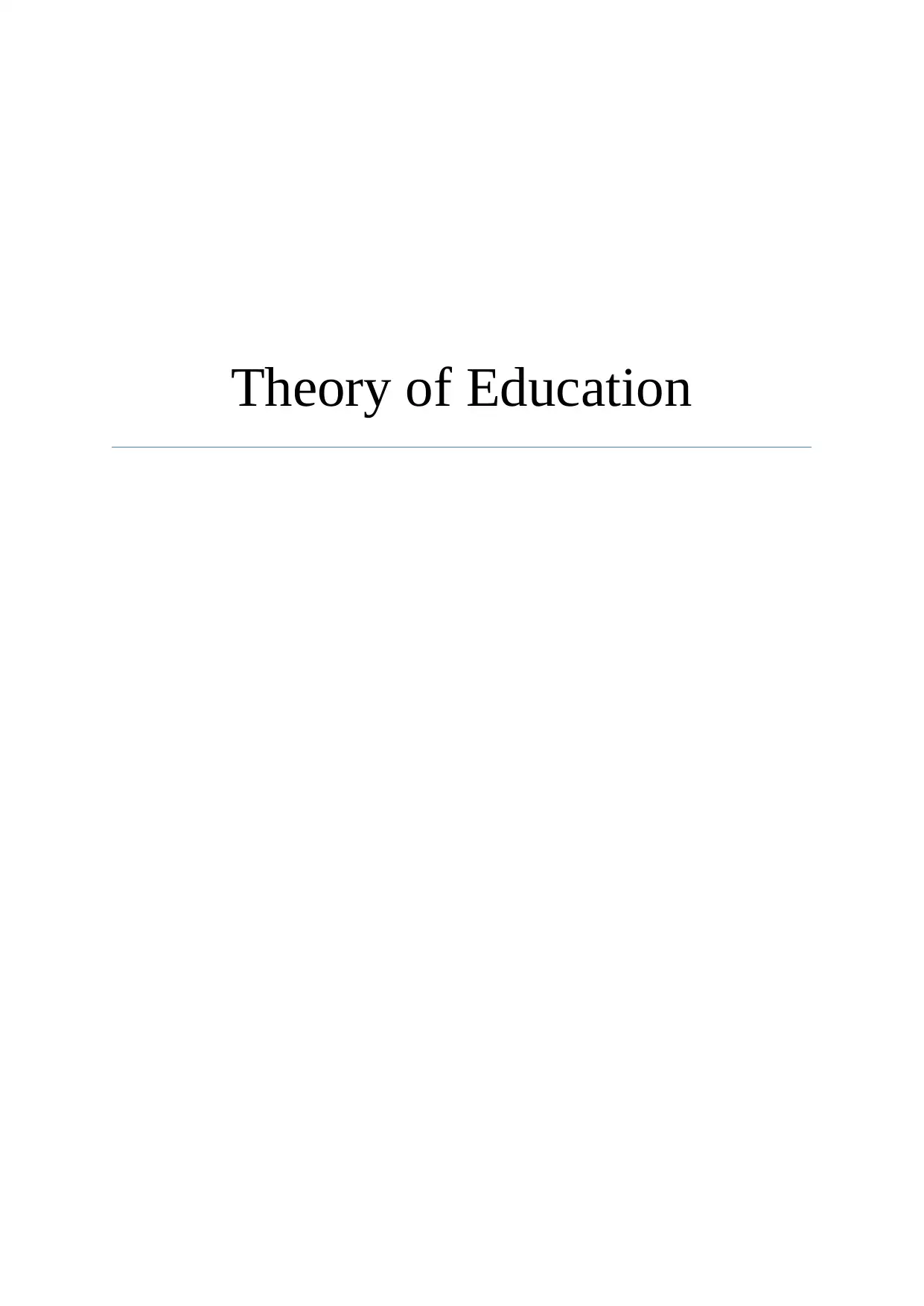
Theory of Education
Paraphrase This Document
Need a fresh take? Get an instant paraphrase of this document with our AI Paraphraser
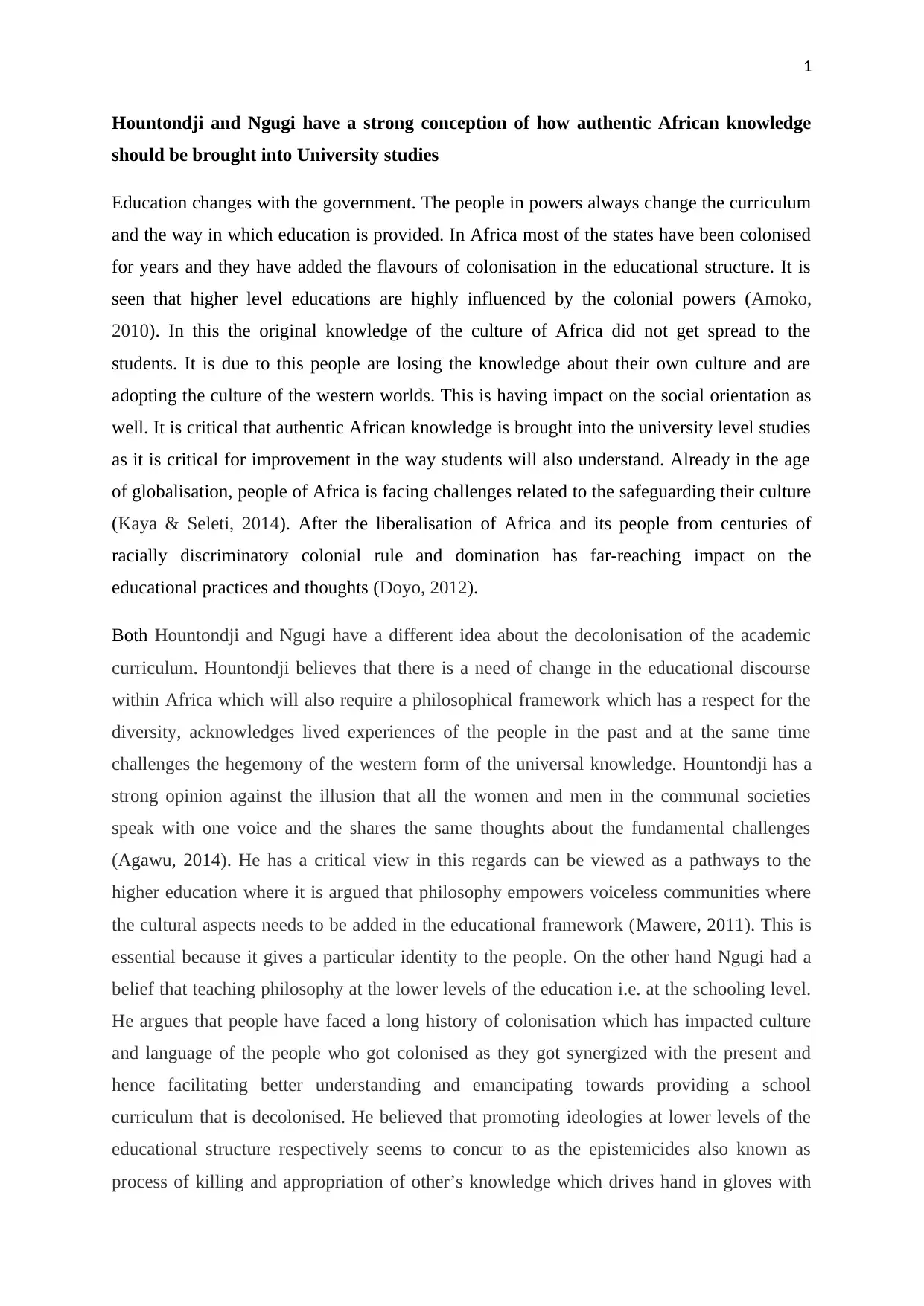
1
Hountondji and Ngugi have a strong conception of how authentic African knowledge
should be brought into University studies
Education changes with the government. The people in powers always change the curriculum
and the way in which education is provided. In Africa most of the states have been colonised
for years and they have added the flavours of colonisation in the educational structure. It is
seen that higher level educations are highly influenced by the colonial powers (Amoko,
2010). In this the original knowledge of the culture of Africa did not get spread to the
students. It is due to this people are losing the knowledge about their own culture and are
adopting the culture of the western worlds. This is having impact on the social orientation as
well. It is critical that authentic African knowledge is brought into the university level studies
as it is critical for improvement in the way students will also understand. Already in the age
of globalisation, people of Africa is facing challenges related to the safeguarding their culture
(Kaya & Seleti, 2014). After the liberalisation of Africa and its people from centuries of
racially discriminatory colonial rule and domination has far-reaching impact on the
educational practices and thoughts (Doyo, 2012).
Both Hountondji and Ngugi have a different idea about the decolonisation of the academic
curriculum. Hountondji believes that there is a need of change in the educational discourse
within Africa which will also require a philosophical framework which has a respect for the
diversity, acknowledges lived experiences of the people in the past and at the same time
challenges the hegemony of the western form of the universal knowledge. Hountondji has a
strong opinion against the illusion that all the women and men in the communal societies
speak with one voice and the shares the same thoughts about the fundamental challenges
(Agawu, 2014). He has a critical view in this regards can be viewed as a pathways to the
higher education where it is argued that philosophy empowers voiceless communities where
the cultural aspects needs to be added in the educational framework (Mawere, 2011). This is
essential because it gives a particular identity to the people. On the other hand Ngugi had a
belief that teaching philosophy at the lower levels of the education i.e. at the schooling level.
He argues that people have faced a long history of colonisation which has impacted culture
and language of the people who got colonised as they got synergized with the present and
hence facilitating better understanding and emancipating towards providing a school
curriculum that is decolonised. He believed that promoting ideologies at lower levels of the
educational structure respectively seems to concur to as the epistemicides also known as
process of killing and appropriation of other’s knowledge which drives hand in gloves with
Hountondji and Ngugi have a strong conception of how authentic African knowledge
should be brought into University studies
Education changes with the government. The people in powers always change the curriculum
and the way in which education is provided. In Africa most of the states have been colonised
for years and they have added the flavours of colonisation in the educational structure. It is
seen that higher level educations are highly influenced by the colonial powers (Amoko,
2010). In this the original knowledge of the culture of Africa did not get spread to the
students. It is due to this people are losing the knowledge about their own culture and are
adopting the culture of the western worlds. This is having impact on the social orientation as
well. It is critical that authentic African knowledge is brought into the university level studies
as it is critical for improvement in the way students will also understand. Already in the age
of globalisation, people of Africa is facing challenges related to the safeguarding their culture
(Kaya & Seleti, 2014). After the liberalisation of Africa and its people from centuries of
racially discriminatory colonial rule and domination has far-reaching impact on the
educational practices and thoughts (Doyo, 2012).
Both Hountondji and Ngugi have a different idea about the decolonisation of the academic
curriculum. Hountondji believes that there is a need of change in the educational discourse
within Africa which will also require a philosophical framework which has a respect for the
diversity, acknowledges lived experiences of the people in the past and at the same time
challenges the hegemony of the western form of the universal knowledge. Hountondji has a
strong opinion against the illusion that all the women and men in the communal societies
speak with one voice and the shares the same thoughts about the fundamental challenges
(Agawu, 2014). He has a critical view in this regards can be viewed as a pathways to the
higher education where it is argued that philosophy empowers voiceless communities where
the cultural aspects needs to be added in the educational framework (Mawere, 2011). This is
essential because it gives a particular identity to the people. On the other hand Ngugi had a
belief that teaching philosophy at the lower levels of the education i.e. at the schooling level.
He argues that people have faced a long history of colonisation which has impacted culture
and language of the people who got colonised as they got synergized with the present and
hence facilitating better understanding and emancipating towards providing a school
curriculum that is decolonised. He believed that promoting ideologies at lower levels of the
educational structure respectively seems to concur to as the epistemicides also known as
process of killing and appropriation of other’s knowledge which drives hand in gloves with
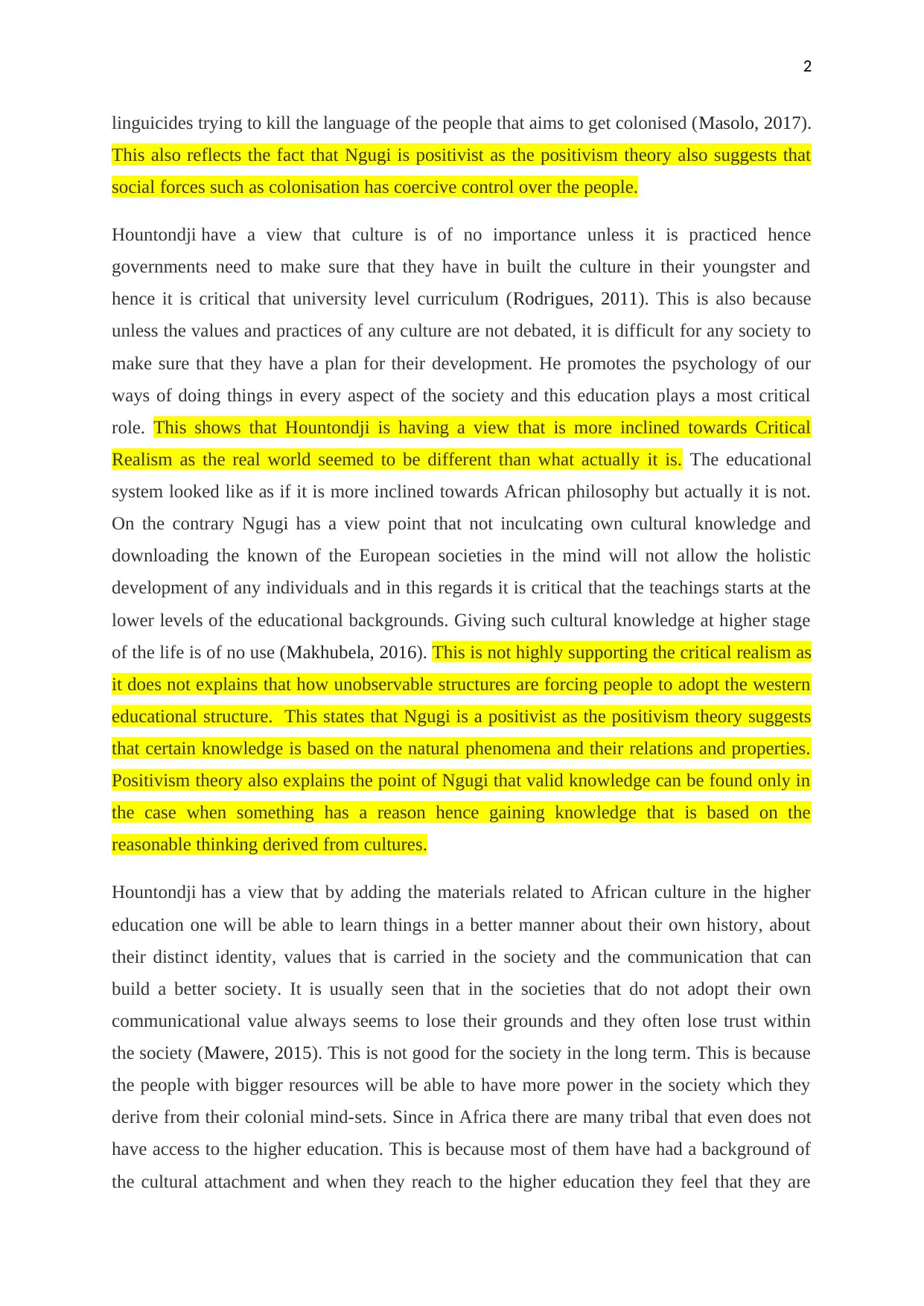
2
linguicides trying to kill the language of the people that aims to get colonised (Masolo, 2017).
This also reflects the fact that Ngugi is positivist as the positivism theory also suggests that
social forces such as colonisation has coercive control over the people.
Hountondji have a view that culture is of no importance unless it is practiced hence
governments need to make sure that they have in built the culture in their youngster and
hence it is critical that university level curriculum (Rodrigues, 2011). This is also because
unless the values and practices of any culture are not debated, it is difficult for any society to
make sure that they have a plan for their development. He promotes the psychology of our
ways of doing things in every aspect of the society and this education plays a most critical
role. This shows that Hountondji is having a view that is more inclined towards Critical
Realism as the real world seemed to be different than what actually it is. The educational
system looked like as if it is more inclined towards African philosophy but actually it is not.
On the contrary Ngugi has a view point that not inculcating own cultural knowledge and
downloading the known of the European societies in the mind will not allow the holistic
development of any individuals and in this regards it is critical that the teachings starts at the
lower levels of the educational backgrounds. Giving such cultural knowledge at higher stage
of the life is of no use (Makhubela, 2016). This is not highly supporting the critical realism as
it does not explains that how unobservable structures are forcing people to adopt the western
educational structure. This states that Ngugi is a positivist as the positivism theory suggests
that certain knowledge is based on the natural phenomena and their relations and properties.
Positivism theory also explains the point of Ngugi that valid knowledge can be found only in
the case when something has a reason hence gaining knowledge that is based on the
reasonable thinking derived from cultures.
Hountondji has a view that by adding the materials related to African culture in the higher
education one will be able to learn things in a better manner about their own history, about
their distinct identity, values that is carried in the society and the communication that can
build a better society. It is usually seen that in the societies that do not adopt their own
communicational value always seems to lose their grounds and they often lose trust within
the society (Mawere, 2015). This is not good for the society in the long term. This is because
the people with bigger resources will be able to have more power in the society which they
derive from their colonial mind-sets. Since in Africa there are many tribal that even does not
have access to the higher education. This is because most of them have had a background of
the cultural attachment and when they reach to the higher education they feel that they are
linguicides trying to kill the language of the people that aims to get colonised (Masolo, 2017).
This also reflects the fact that Ngugi is positivist as the positivism theory also suggests that
social forces such as colonisation has coercive control over the people.
Hountondji have a view that culture is of no importance unless it is practiced hence
governments need to make sure that they have in built the culture in their youngster and
hence it is critical that university level curriculum (Rodrigues, 2011). This is also because
unless the values and practices of any culture are not debated, it is difficult for any society to
make sure that they have a plan for their development. He promotes the psychology of our
ways of doing things in every aspect of the society and this education plays a most critical
role. This shows that Hountondji is having a view that is more inclined towards Critical
Realism as the real world seemed to be different than what actually it is. The educational
system looked like as if it is more inclined towards African philosophy but actually it is not.
On the contrary Ngugi has a view point that not inculcating own cultural knowledge and
downloading the known of the European societies in the mind will not allow the holistic
development of any individuals and in this regards it is critical that the teachings starts at the
lower levels of the educational backgrounds. Giving such cultural knowledge at higher stage
of the life is of no use (Makhubela, 2016). This is not highly supporting the critical realism as
it does not explains that how unobservable structures are forcing people to adopt the western
educational structure. This states that Ngugi is a positivist as the positivism theory suggests
that certain knowledge is based on the natural phenomena and their relations and properties.
Positivism theory also explains the point of Ngugi that valid knowledge can be found only in
the case when something has a reason hence gaining knowledge that is based on the
reasonable thinking derived from cultures.
Hountondji has a view that by adding the materials related to African culture in the higher
education one will be able to learn things in a better manner about their own history, about
their distinct identity, values that is carried in the society and the communication that can
build a better society. It is usually seen that in the societies that do not adopt their own
communicational value always seems to lose their grounds and they often lose trust within
the society (Mawere, 2015). This is not good for the society in the long term. This is because
the people with bigger resources will be able to have more power in the society which they
derive from their colonial mind-sets. Since in Africa there are many tribal that even does not
have access to the higher education. This is because most of them have had a background of
the cultural attachment and when they reach to the higher education they feel that they are
⊘ This is a preview!⊘
Do you want full access?
Subscribe today to unlock all pages.

Trusted by 1+ million students worldwide
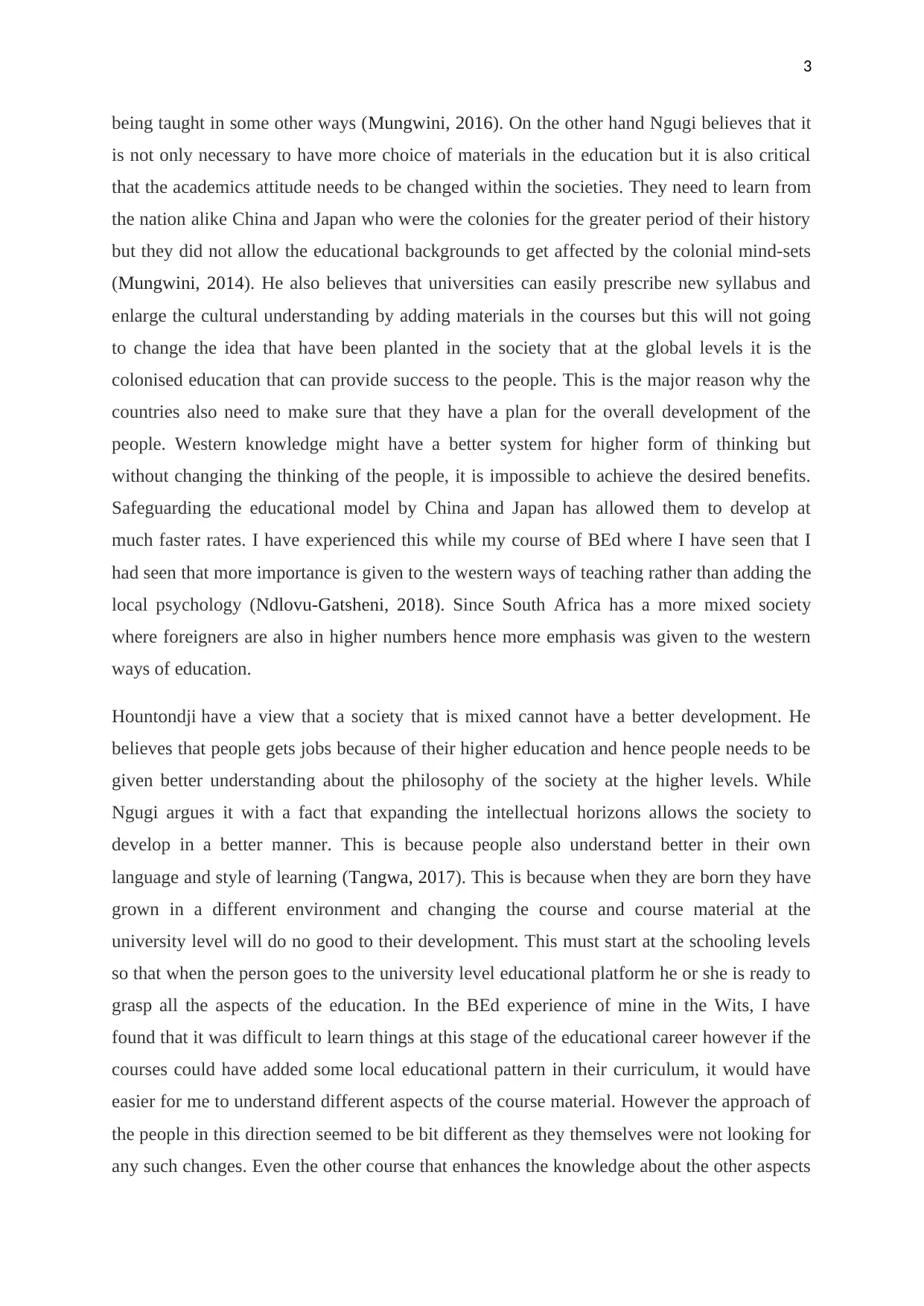
3
being taught in some other ways (Mungwini, 2016). On the other hand Ngugi believes that it
is not only necessary to have more choice of materials in the education but it is also critical
that the academics attitude needs to be changed within the societies. They need to learn from
the nation alike China and Japan who were the colonies for the greater period of their history
but they did not allow the educational backgrounds to get affected by the colonial mind-sets
(Mungwini, 2014). He also believes that universities can easily prescribe new syllabus and
enlarge the cultural understanding by adding materials in the courses but this will not going
to change the idea that have been planted in the society that at the global levels it is the
colonised education that can provide success to the people. This is the major reason why the
countries also need to make sure that they have a plan for the overall development of the
people. Western knowledge might have a better system for higher form of thinking but
without changing the thinking of the people, it is impossible to achieve the desired benefits.
Safeguarding the educational model by China and Japan has allowed them to develop at
much faster rates. I have experienced this while my course of BEd where I have seen that I
had seen that more importance is given to the western ways of teaching rather than adding the
local psychology (Ndlovu-Gatsheni, 2018). Since South Africa has a more mixed society
where foreigners are also in higher numbers hence more emphasis was given to the western
ways of education.
Hountondji have a view that a society that is mixed cannot have a better development. He
believes that people gets jobs because of their higher education and hence people needs to be
given better understanding about the philosophy of the society at the higher levels. While
Ngugi argues it with a fact that expanding the intellectual horizons allows the society to
develop in a better manner. This is because people also understand better in their own
language and style of learning (Tangwa, 2017). This is because when they are born they have
grown in a different environment and changing the course and course material at the
university level will do no good to their development. This must start at the schooling levels
so that when the person goes to the university level educational platform he or she is ready to
grasp all the aspects of the education. In the BEd experience of mine in the Wits, I have
found that it was difficult to learn things at this stage of the educational career however if the
courses could have added some local educational pattern in their curriculum, it would have
easier for me to understand different aspects of the course material. However the approach of
the people in this direction seemed to be bit different as they themselves were not looking for
any such changes. Even the other course that enhances the knowledge about the other aspects
being taught in some other ways (Mungwini, 2016). On the other hand Ngugi believes that it
is not only necessary to have more choice of materials in the education but it is also critical
that the academics attitude needs to be changed within the societies. They need to learn from
the nation alike China and Japan who were the colonies for the greater period of their history
but they did not allow the educational backgrounds to get affected by the colonial mind-sets
(Mungwini, 2014). He also believes that universities can easily prescribe new syllabus and
enlarge the cultural understanding by adding materials in the courses but this will not going
to change the idea that have been planted in the society that at the global levels it is the
colonised education that can provide success to the people. This is the major reason why the
countries also need to make sure that they have a plan for the overall development of the
people. Western knowledge might have a better system for higher form of thinking but
without changing the thinking of the people, it is impossible to achieve the desired benefits.
Safeguarding the educational model by China and Japan has allowed them to develop at
much faster rates. I have experienced this while my course of BEd where I have seen that I
had seen that more importance is given to the western ways of teaching rather than adding the
local psychology (Ndlovu-Gatsheni, 2018). Since South Africa has a more mixed society
where foreigners are also in higher numbers hence more emphasis was given to the western
ways of education.
Hountondji have a view that a society that is mixed cannot have a better development. He
believes that people gets jobs because of their higher education and hence people needs to be
given better understanding about the philosophy of the society at the higher levels. While
Ngugi argues it with a fact that expanding the intellectual horizons allows the society to
develop in a better manner. This is because people also understand better in their own
language and style of learning (Tangwa, 2017). This is because when they are born they have
grown in a different environment and changing the course and course material at the
university level will do no good to their development. This must start at the schooling levels
so that when the person goes to the university level educational platform he or she is ready to
grasp all the aspects of the education. In the BEd experience of mine in the Wits, I have
found that it was difficult to learn things at this stage of the educational career however if the
courses could have added some local educational pattern in their curriculum, it would have
easier for me to understand different aspects of the course material. However the approach of
the people in this direction seemed to be bit different as they themselves were not looking for
any such changes. Even the other course that enhances the knowledge about the other aspects
Paraphrase This Document
Need a fresh take? Get an instant paraphrase of this document with our AI Paraphraser
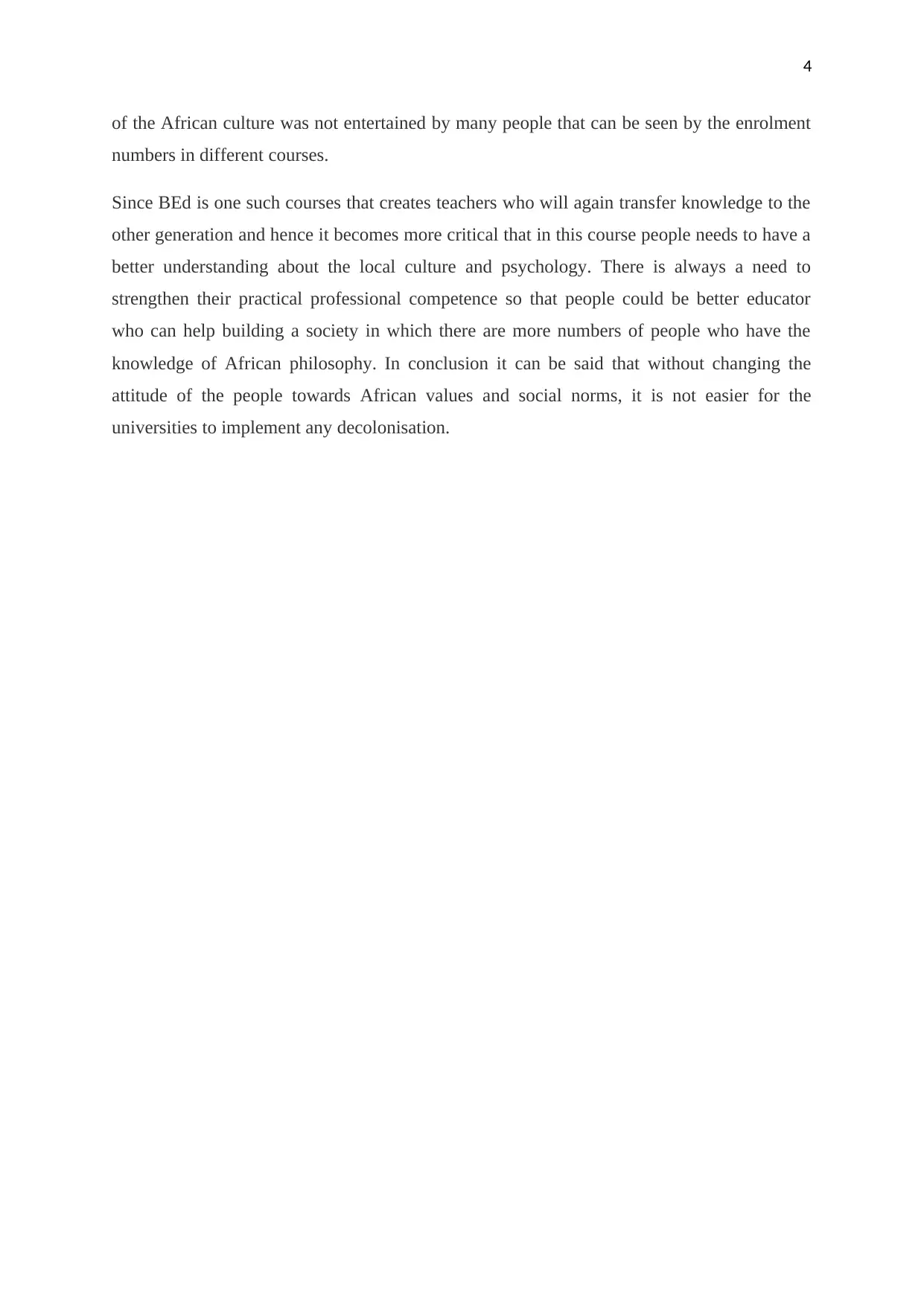
4
of the African culture was not entertained by many people that can be seen by the enrolment
numbers in different courses.
Since BEd is one such courses that creates teachers who will again transfer knowledge to the
other generation and hence it becomes more critical that in this course people needs to have a
better understanding about the local culture and psychology. There is always a need to
strengthen their practical professional competence so that people could be better educator
who can help building a society in which there are more numbers of people who have the
knowledge of African philosophy. In conclusion it can be said that without changing the
attitude of the people towards African values and social norms, it is not easier for the
universities to implement any decolonisation.
of the African culture was not entertained by many people that can be seen by the enrolment
numbers in different courses.
Since BEd is one such courses that creates teachers who will again transfer knowledge to the
other generation and hence it becomes more critical that in this course people needs to have a
better understanding about the local culture and psychology. There is always a need to
strengthen their practical professional competence so that people could be better educator
who can help building a society in which there are more numbers of people who have the
knowledge of African philosophy. In conclusion it can be said that without changing the
attitude of the people towards African values and social norms, it is not easier for the
universities to implement any decolonisation.
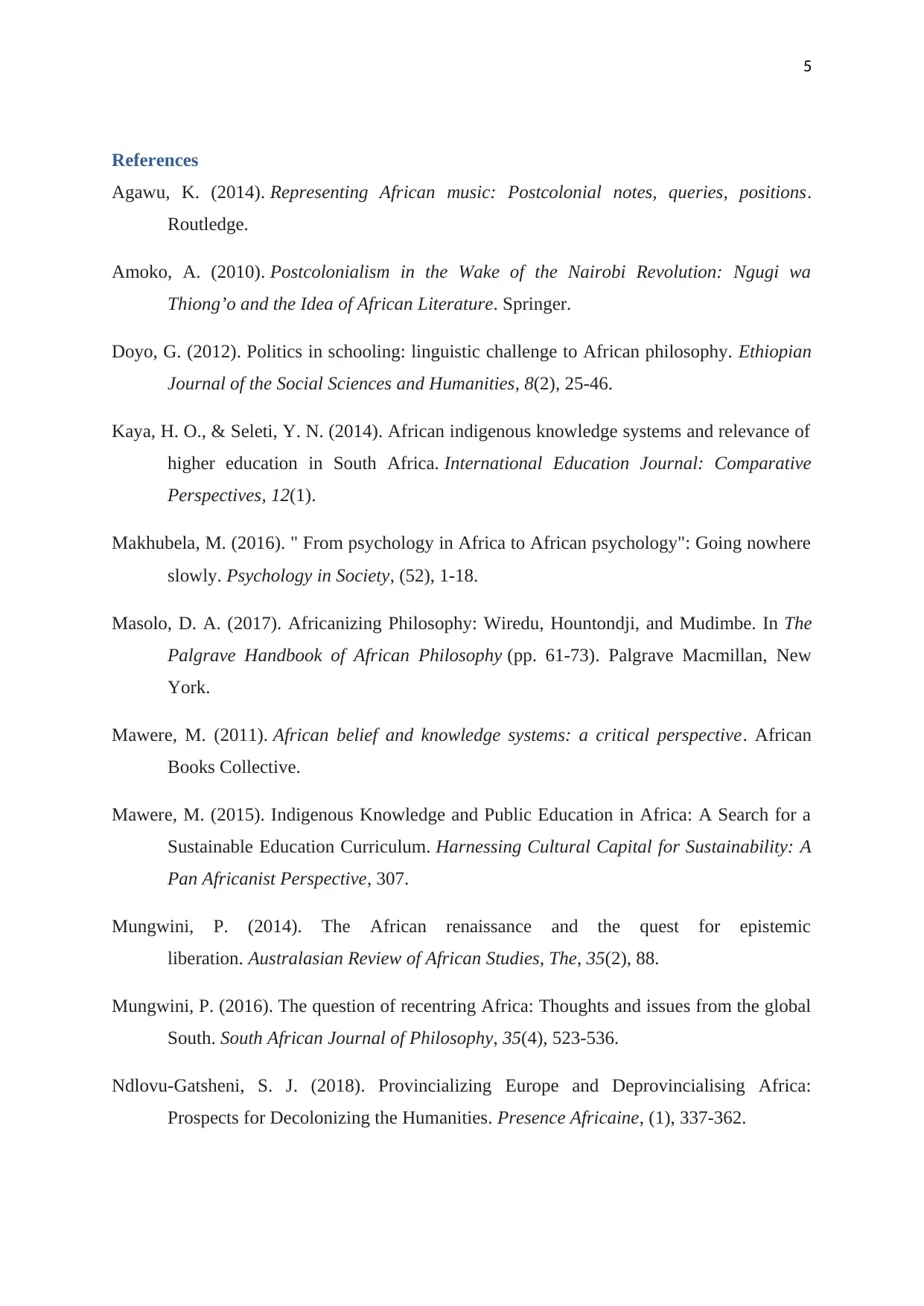
5
References
Agawu, K. (2014). Representing African music: Postcolonial notes, queries, positions.
Routledge.
Amoko, A. (2010). Postcolonialism in the Wake of the Nairobi Revolution: Ngugi wa
Thiong’o and the Idea of African Literature. Springer.
Doyo, G. (2012). Politics in schooling: linguistic challenge to African philosophy. Ethiopian
Journal of the Social Sciences and Humanities, 8(2), 25-46.
Kaya, H. O., & Seleti, Y. N. (2014). African indigenous knowledge systems and relevance of
higher education in South Africa. International Education Journal: Comparative
Perspectives, 12(1).
Makhubela, M. (2016). " From psychology in Africa to African psychology": Going nowhere
slowly. Psychology in Society, (52), 1-18.
Masolo, D. A. (2017). Africanizing Philosophy: Wiredu, Hountondji, and Mudimbe. In The
Palgrave Handbook of African Philosophy (pp. 61-73). Palgrave Macmillan, New
York.
Mawere, M. (2011). African belief and knowledge systems: a critical perspective. African
Books Collective.
Mawere, M. (2015). Indigenous Knowledge and Public Education in Africa: A Search for a
Sustainable Education Curriculum. Harnessing Cultural Capital for Sustainability: A
Pan Africanist Perspective, 307.
Mungwini, P. (2014). The African renaissance and the quest for epistemic
liberation. Australasian Review of African Studies, The, 35(2), 88.
Mungwini, P. (2016). The question of recentring Africa: Thoughts and issues from the global
South. South African Journal of Philosophy, 35(4), 523-536.
Ndlovu-Gatsheni, S. J. (2018). Provincializing Europe and Deprovincialising Africa:
Prospects for Decolonizing the Humanities. Presence Africaine, (1), 337-362.
References
Agawu, K. (2014). Representing African music: Postcolonial notes, queries, positions.
Routledge.
Amoko, A. (2010). Postcolonialism in the Wake of the Nairobi Revolution: Ngugi wa
Thiong’o and the Idea of African Literature. Springer.
Doyo, G. (2012). Politics in schooling: linguistic challenge to African philosophy. Ethiopian
Journal of the Social Sciences and Humanities, 8(2), 25-46.
Kaya, H. O., & Seleti, Y. N. (2014). African indigenous knowledge systems and relevance of
higher education in South Africa. International Education Journal: Comparative
Perspectives, 12(1).
Makhubela, M. (2016). " From psychology in Africa to African psychology": Going nowhere
slowly. Psychology in Society, (52), 1-18.
Masolo, D. A. (2017). Africanizing Philosophy: Wiredu, Hountondji, and Mudimbe. In The
Palgrave Handbook of African Philosophy (pp. 61-73). Palgrave Macmillan, New
York.
Mawere, M. (2011). African belief and knowledge systems: a critical perspective. African
Books Collective.
Mawere, M. (2015). Indigenous Knowledge and Public Education in Africa: A Search for a
Sustainable Education Curriculum. Harnessing Cultural Capital for Sustainability: A
Pan Africanist Perspective, 307.
Mungwini, P. (2014). The African renaissance and the quest for epistemic
liberation. Australasian Review of African Studies, The, 35(2), 88.
Mungwini, P. (2016). The question of recentring Africa: Thoughts and issues from the global
South. South African Journal of Philosophy, 35(4), 523-536.
Ndlovu-Gatsheni, S. J. (2018). Provincializing Europe and Deprovincialising Africa:
Prospects for Decolonizing the Humanities. Presence Africaine, (1), 337-362.
⊘ This is a preview!⊘
Do you want full access?
Subscribe today to unlock all pages.

Trusted by 1+ million students worldwide
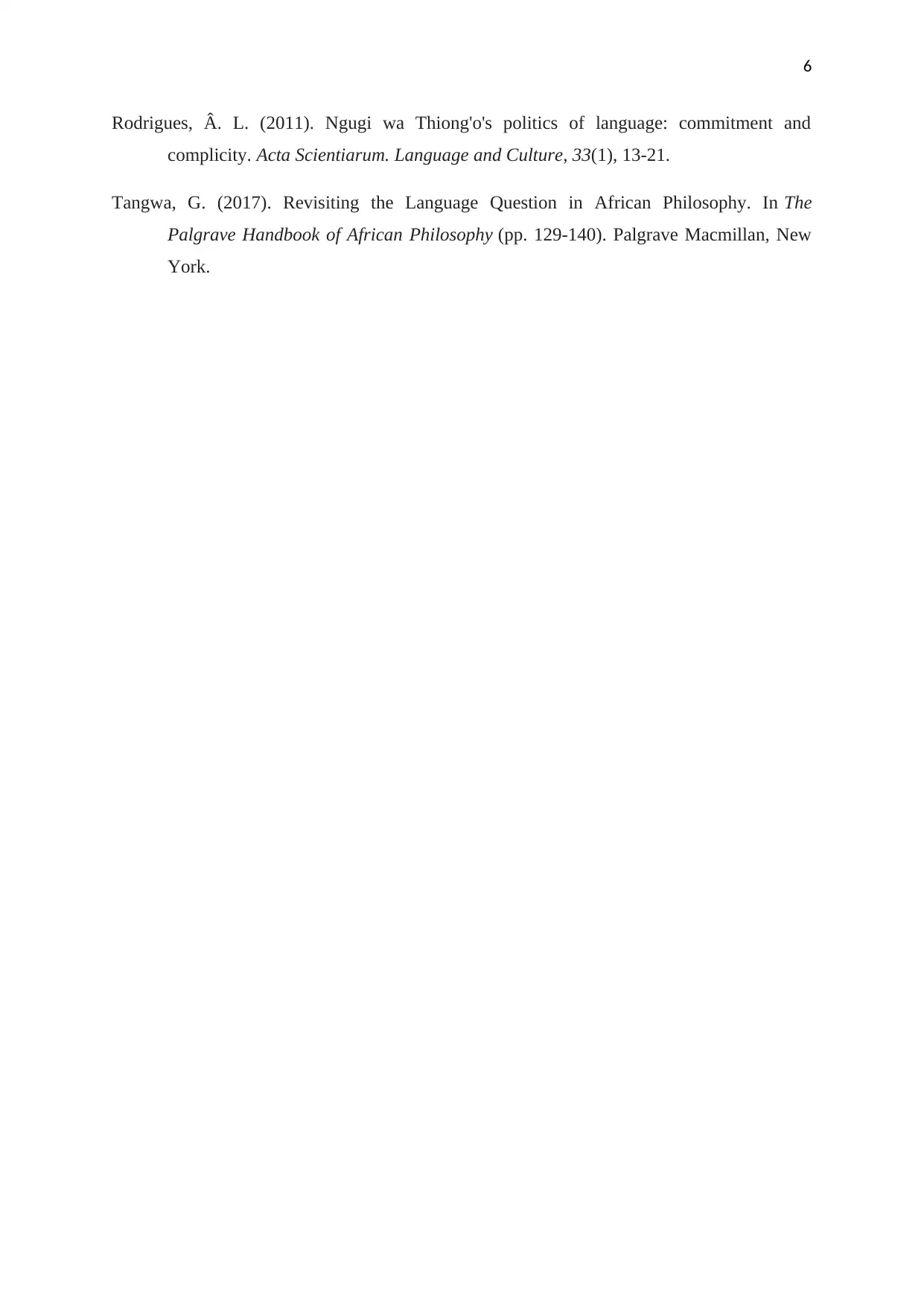
6
Rodrigues, Â. L. (2011). Ngugi wa Thiong'o's politics of language: commitment and
complicity. Acta Scientiarum. Language and Culture, 33(1), 13-21.
Tangwa, G. (2017). Revisiting the Language Question in African Philosophy. In The
Palgrave Handbook of African Philosophy (pp. 129-140). Palgrave Macmillan, New
York.
Rodrigues, Â. L. (2011). Ngugi wa Thiong'o's politics of language: commitment and
complicity. Acta Scientiarum. Language and Culture, 33(1), 13-21.
Tangwa, G. (2017). Revisiting the Language Question in African Philosophy. In The
Palgrave Handbook of African Philosophy (pp. 129-140). Palgrave Macmillan, New
York.
1 out of 7
Your All-in-One AI-Powered Toolkit for Academic Success.
+13062052269
info@desklib.com
Available 24*7 on WhatsApp / Email
![[object Object]](/_next/static/media/star-bottom.7253800d.svg)
Unlock your academic potential
Copyright © 2020–2026 A2Z Services. All Rights Reserved. Developed and managed by ZUCOL.

